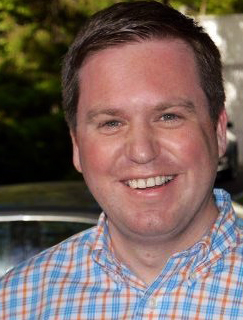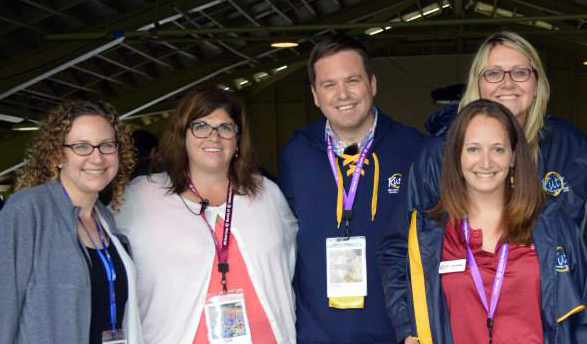Dan Lange
 On dreaming big and working as a Jewish professional
On dreaming big and working as a Jewish professional
Feeling like he wasn't making a meaningful impact in his work, Dan Lange, MA/MBA’13 left the film industry to work in the Jewish community.
“My first full-time job in the Jewish community was as youth director at Temple Isaiah in Lafayette, CA. [From the beginning] I was excited and energized by my work. I looked forward to going in each day. And most importantly — I was able to see in clear, tangible ways how I was contributing to society and making a direct impact in peoples’ lives.”
Today he is associate director of North American Camping at the Union for Reform Judaism. Dan’s first experiences as a 7-year-old at Jewish summer camp were “challenging,” he admits. “But I turned a corner and found my way.”
Camp “helps teach young people to be independent,” he says. While there are many different types of Jewish summer camps, there is a real effort in the Jewish camping field “to be inclusive and open, and to create meaningful opportunities for every child.”
 Dan Lange posed with colleagues this summer at Kutz Camp in Warwick, NY.
Dan Lange posed with colleagues this summer at Kutz Camp in Warwick, NY.
“I love Jewish camping; I think it is extremely powerful and engaging; and I believe strongly in its power. While my job now is primarily connected to camping, by no means would I say that I only see myself as a ‘camp professional.’ Quite the contrary — I am a Jewish professional who does work focused on engaging and retaining young Jews through a variety of methods of which camp just happens to be one of the best.”
Dan has three items hung on the wall in his office, and “by far the most meaningful” is Bernie Reisman’s Jewish Communal Professional’s Code of Ethics. “It is so simple,” says Dan, “its focus on Jewish values reminds me daily of how I want to conduct myself in my role as a Jewish professional leader.
In His Own Words: An Interview with Dan Lange
Expand All
From the time that I was very young I was interested in the film industry. I received my undergraduate degree in cinematic studies from the University of Southern California’s Film School. Soon after, I began working in Hollywood, starting as a production assistant for Paramount Pictures. I reported to work each day ready to tackle the film industry. Within weeks, though, I found myself dreading going to work, doing nothing of meaning and feeling underwhelmed. I craved work that helped people, which made a difference to someone.
I had been teaching religious school ‘on the side’ through college and this first job to make some extra money and stay connected to the Jewish community. I grew up attending Jewish summer camp and loved it, and thought early on in college that this might be a way to find another entry into Jewish life that was appealing and interesting for me. I was right — I thrived in this role and looked forward to the few hours of work I put in each week. One day, after leaving my ‘day job’ at Paramount, I drove over to the temple to teach a class on Jews and Humor to a group of teenagers. When I arrived, the director of education pulled me aside and said something along the lines of, “Dan, you look so miserable when you walk in these doors each day, but when you leave you are so happy. You need to reevaluate your career. This kind of work is right for you.”
This was an A-HA! moment for me, something I feel strongly that everyone needs to experience at least once. It took hearing this for me to realize what everyone around me already knew — I needed to focus on work that was fulfilling, even if it meant giving up a long-held dream. I went home that night and began my research. Within a week I had applied to a few youth director positions at Reform synagogues around North America. I lucked out — a few weeks later I flew to San Francisco and soon after was hired as the full time youth director at Temple Isaiah in Lafayette, California. Within the first few days of the job it was clear to me that this was the right move. I was excited and energized by my work. I looked forward to going in each day. And most importantly — I was able to see in clear, tangible ways how I was contributing to society and making a direct impact in peoples’ lives.
My original intent was not specifically to work in the field of camping. While my interest for the last many years has been in Jewish youth work and ways to engage young people in meaningful Judaism, I view camp as only one of many avenues to accomplish this. I grew up attending Jewish summer camp and loved the experience; it changed who I was and what I believed in and helped me to build self-confidence, independence, leadership skills and so much more. It was during my work as the youth director at Temple Isaiah that I saw a potential career in camping. After three years in the role, as I began to think about next steps, I actively considered applying to Jewish camp jobs rather than attending graduate school. I ultimately decided that it was the right moment for me to return to school and that, as a result of schooling, I would be able to do much more and reach much further within the field. I love Jewish camping; I think it is extremely powerful and engaging; and I believe strongly in its power. While my job now is primarily connected to camping, by no means would I say that I only see myself as a ‘camp professional.’ Quite the contrary — I am a Jewish professional who does work focused on engaging and retaining young Jews through a variety of methods of which camp just happens to be one of the best.
On my first day as the youth director at Temple Isaiah I received a marketing email from the Hornstein program addressed to my predecessor. I read through the email and was immediately intrigued— the program sounded fantastic! I reminded myself quickly that I was literally on my first day of a new job and there was no way I could even think about something like this. I filed the email away and, three years later when I was ready to start thinking about my next steps, I pulled it out. I was equally intrigued three years later and was particularly excited by the focus on youth, summer camp and informal education.
I had plans to spend Thanksgiving with family in New York, so I tacked a few days onto the trip and visited the campus. After a tour and meeting with Carol Hengerle, interview with Ellen Smith, meeting with Joe Reimer and an opportunity to sit in on a class with Amy Sales, I knew I had found a place I could thrive. It was very clear to me that Hornstein as a community was incredibly strong and caring. Within a week I knew every member of my cohort and we stay connected to this day. It’s been extraordinarily positive.
Without question my time at Hornstein has helped me in my work. Day to day, I find myself returning to the conversations I had with classmates and professors during graduate school on a wide variety of topics: leadership, values, working with lay leaders, managing change, etc. It is the lessons learned in courses with Hornstein professors that I apply to my work on a daily basis.
My interest in working in the Jewish informal educational space developed long before my time with Passport NYC. That said, my experience working at Passport NYC at 92Y helped me to clarify and distill my personal goals and vision for my future. The summer was a great one, and beyond it helping me focus in on where I wanted to head in the next year and beyond, it gave me a much needed reminder of why I do the work I do.
Truth be told, I have no idea what I want to do when I grow up. Right now, I am really enjoying my work at the North American level in the field of Jewish camping. I can foresee a future where I remain at the North American level, advancing and continuing to affect change. For me, the most important thing will be ensuring that my values align with the organization's mission, and that I am able to focus on work that feels resonant and important to me. On the other end of the spectrum, I can imagine moving into a more localized position as the director of a Jewish summer camp. This would certainly fulfill one of my long-term professional goals from the last decade, and would give me an opportunity to directly impact thousands of young people.
 On dreaming big and working as a Jewish professional
On dreaming big and working as a Jewish professional Dan Lange posed with colleagues this summer at Kutz Camp in Warwick, NY.
Dan Lange posed with colleagues this summer at Kutz Camp in Warwick, NY.